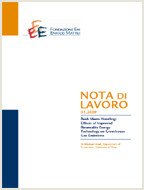Fiscal Policy and CO2 Emissions of New Passenger Cars in the EU

Data
20.04.2015
20.04.2015
Autori
Reyer Gerlagh (Tilburg University); Inge van den Bijgaart (Tilburg University); Hans Nijland (PBL Netherlands Environmental Assessment Agency); Thomas Michielsen (CPB Netherlands Bureau for Economic Policy Analysis)
Codice JEL
H30, L62, Q48, Q54, Q58, R48
H30, L62, Q48, Q54, Q58, R48
Parole chiave:
Vehicle Registration Taxes, Fuel Taxes, CO2 Emissions
Vehicle Registration Taxes, Fuel Taxes, CO2 Emissions
Publisher
Climate Change and Sustainable Development
Climate Change and Sustainable Development
Editor
Carlo Carraro
Carlo Carraro
To what extent have national fiscal policies contributed to the decarbonisation of newly sold passenger cars? We construct a simple model that generates predictions regarding the effect of fiscal policies on average CO2 emissions of new cars, and then test the model empirically. Our empirical strategy combines a diverse series of data. First, we use a large database of vehicle-specific taxes in 15 EU countries over 2001-2010 to construct a measure for the vehicle registration and annual road tax levels, and separately, for the CO2 sensitivity of these taxes. We find that for many countries the fiscal policies have become more sensitive to CO2 emissions of new cars. We then use these constructed measures to estimate the effect of fiscal policies on the CO2 emissions of the new car fleet. The increased CO2-sensitivity of registration taxes have reduced the CO2 emission intensity of the average new car by 1,3 percent, partly through an induced increase of the share of diesel-fuelled cars by 6,5 percentage points. Higher fuel taxes lead to the purchase of more fuel efficient cars, but higher annual road taxes have no or an adverse effect.
***
Suggested citation: Gerlagh, R., I. van den Bijgaart, H. Nijland, T. Michielsen, (2015), ‘Fiscal Policy and CO2 Emissions of New Passenger Cars in the EU’, Nota di Lavoro 32.2015, Milan, Italy: Fondazione Eni Enrico Mattei
